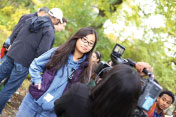Race, Gender, and Politics in Documentary Filmmaking
- Geri Alumit Zeldes
- Associate Professor
- School of Journalism
- College of Communication Arts and Sciences
No one has to sell Geri Alumit Zeldes on the virtues of collaborative learning. She's a filmmaker.
As Zeldes, her former student Jessica Lipowski, and faculty colleague Robert Albers pointed out in a recent article,[1] "Working on a film crew is an exercise [emphasis added] in collaborative learning." The proof is in the product— Zeldes and her students have created a number of award-winning productions.
"Engaging with audiences and trying to get researchers and academics outside to engage with them, that's the real gift of these projects."
Geri Alumit Zeldes
"The Kings of Flint" video features karate masters Jacky and Dora King of Beecher, a community near Flint. By teaching karate and urban farming to local students, the Kings are attempting to re-grow their community.
"The most important thing the documentary did was tell our story, or at least part of it, to a whole lot more people. It tied us to people doing things all over. We know now we're not alone. It goes a long ways toward restoring hope."
Dora King
Zeldes and specialist Troy Hale, who holds a joint appointment in the Department of Telecommunication, Information Studies, and Media and the School of Journalism, visited the Kings in 2009. Hale edited a two-minute clip of the visit that an Associated Press reporter saw on the Great Lakes Echo news service.[2] After that, features about the Kings appeared in the Chicago Tribune, in the Detroit News, and on National Public Radio.
Zeldes, Hale, and the journalism students worked on additional video clips about the Kings, with the intention of building a longer documentary when funding became available—which it eventually did, through the Ruth Mott Foundation and the College of Communication Arts and Sciences. A 30-minute version premiered in February 2011 at the Beecher Village Hall in Flint.
"The Kings of Flint" received an Emmy nomination from the National Academy of Television Arts & Sciences — Michigan Chapter and a Best Mini-Doc/Series in Public TV award from the Michigan Association of Broadcasters.
Hale commented that "Every time you make a documentary film you learn new things. You start to care about the people in the film and the issues that are important to them. The collaboration is so important. The film crew and the Kings needed to trust each other to tell the story. It is our job as filmmakers to be true to the story and to present it in the most entertaining and informational way."

"When we're interviewing Chinese students I get why there's so much pressure on them to succeed. I know what they're going through. I'm an immigrant myself."
Geri Alumit Zeldes
Alyssa Firth, who was a student producer for the film, agreed. "Learning about documentary filmmaking involves more of actually doing it rather than classroom lectures," she said. "It helps to work with a team of people on one specific subject rather than trying to learn about an entire genre in a lecture setting. The most valuable thing I learned was how to approach interview subjects. Not everyone wants to talk to you! I definitely learned a lot about how communities can come together. This city isn't how the media or outsiders portray it. There are a lot of hardworking people who want to create a better environment for everyone."

"The Kings of Flint" received an Emmy nomination from the National Academy of Television Arts & Sciences — Michigan Chapter and a Best Mini-Doc/Series in Public TV award from the Michigan Association of Broadcasters.
Lately she has been finding that her projects "are becoming more personal. I feel really attached to these narratives." Her reason is simple: "I am Filipino and of Chinese descent," she said. "When we're interviewing Chinese students I get why there's so much pressure on them to succeed. I know what they're going through. I'm an immigrant myself."
She also believes that "engaging with audiences and trying to get researchers and academics outside to engage with them, that's the real gift of these projects. One of my greatest joys is that I get to be in the audience as the films screen. I love it when the audience interacts with the films, which was the case with our documentary 'Arabs, Jews, and the News.' We had audience members yelling with glee and disgust, and asking questions and challenging us afterward."
"My mission behind choosing the documentary film genre was to extend the audience beyond those who may learn about these topics in newspaper articles and scholarly journals. Documentary filmmaking is akin to my work in quantitative and qualitative content analysis, in that the process involves finding patterns in the content. The process is similar in that you're trying to analyze and speculate as to why this content is the way it is."
- Written by Linda Chapel Jackson, University Outreach and Engagement
Sources
- Lipowski, J., Zeldes, G. A., & Albers, R. (2011). Infusing a documentary education ethos. Electronic News, 5, 132-137.
- Great Lakes Echo is a project of MSU's Knight Center for Environmental Journalism.